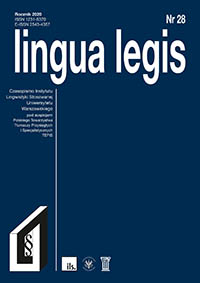ISO 20771:2020 overview and legal translator competence requirements in the context of the European Qualifications Framework, ISO 17100:2015 and relevant research
Abstrakt
The article provides an overview of legal translator competence set in the ISO 20771:2020 standard in the context of relevant research, European Qualifi cations Framework (EQF) and ISO 17100:2015 with the aim of determining the similarities and diff erences between the various approaches, the extent to which the referenced resources conform to or diff er from the ISO 20771:2020 requirements, and the practical implications thereof. Some relevant translator competence research and models are referenced here in order to provide more context and information, and illustrate the potential gap or overlap between research and current industry best-practice refl ected in ISO standards. On the basis of analysis of the referenced resources and the background information on ISO standards development process, the author demonstrates that consensus-based ISO standards take a pragmatic approach and provide most accurate information about professional translator requirements. Th e author posits that ISO requirements standards are also, by defi nition, more operational and easier to validate through conformance assessment than any other models or resources and that is why the industry uptake and implementation of standards is so signifi cant. There have been a lot of discussions within the industry and the academia on translator competence and qualifi cations requirements. Given the fact that ISO standards are the most important source of information on actual market requirements for translators, prevalent industry terminology and industry best practice, they need to be taken on board by all stakeholders. This overview of the industry’s pragmatic approach to legal translator competence and other translator requirements, as refl ected in ISO 20771, also outlines some of the practical and professional implications of industry standardization in the hope that it might become the starting point for more discussions on this subject in the future.





